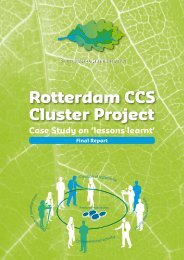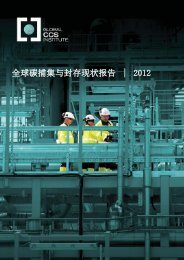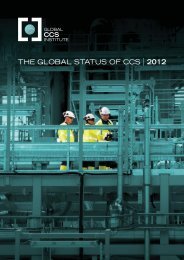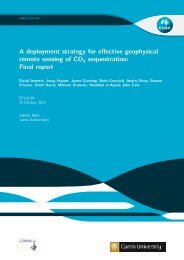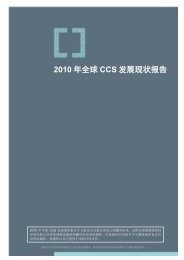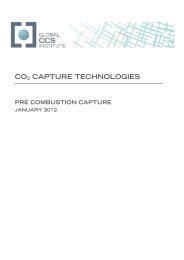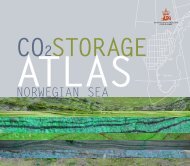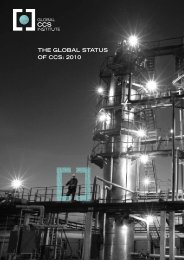Perceptions of CO2 Report - Global CCS Institute
Perceptions of CO2 Report - Global CCS Institute
Perceptions of CO2 Report - Global CCS Institute
- No tags were found...
Create successful ePaper yourself
Turn your PDF publications into a flip-book with our unique Google optimized e-Paper software.
7.2.4 AWARENESS AND PERCEPTIONS OF <strong>CCS</strong>After the measures <strong>of</strong> CO 2 impressions and the introductory text about <strong>CCS</strong>, respondents wereasked whether they had heard about <strong>CCS</strong> before receiving this information. About a half (53%) <strong>of</strong>all respondents had not, and one quarter <strong>of</strong> the remaining respondents (47%) answered that theyhad heard <strong>of</strong> it but did not really know what it is. Twenty per cent responded “I have heard about itand I know a little about it”, and only 5% responded “I have heard about it and I know a lot aboutit.”The Netherlands showed the greatest awareness <strong>of</strong> <strong>CCS</strong> among the three countries, as 64% <strong>of</strong>respondents had heard about <strong>CCS</strong> to some extent. The quantitative results corresponded with theinterview data, which showed that interviewees in the Netherlands had greater awareness <strong>of</strong> <strong>CCS</strong>than those in Australia or Japan. Japan had the lowest awareness <strong>of</strong> <strong>CCS</strong>, with only 35% <strong>of</strong> theJapanese survey respondents indicating that they had heard about it. In Australia, 40% <strong>of</strong> thesurvey respondents had heard about <strong>CCS</strong>; and 2.3% indicated that they knew a lot about it, whichwas comparable to the result in the Netherlands. Results also showed that awareness does notdirectly imply knowledge, as in all cases approximately one quarter <strong>of</strong> respondents indicatedhaving heard about <strong>CCS</strong>, but not really knowing what it is.A series <strong>of</strong> questions was asked on how likely participants believed various <strong>CCS</strong> consequences tobe. Another series <strong>of</strong> questions addressed beliefs relating to CO₂’s effects in <strong>CCS</strong>. Analysis wasconducted to determine how misunderstandings <strong>of</strong> CO 2 ’s behaviour in <strong>CCS</strong> are affected bymisunderstandings <strong>of</strong> CO 2 and by information provision. Results are shown in Table 12 inAppendix F. Almost all misperceptions about CO 2 were found to be correlated to misperceptionsabout <strong>CCS</strong>. It was found that respondents’ level <strong>of</strong> misunderstanding <strong>of</strong> CO 2 was related to howrisky they perceived <strong>CCS</strong> to be.The following table summarizes results from regression analyses comparing participants’misunderstandings <strong>of</strong> CO 2 to their knowledge <strong>of</strong> <strong>CCS</strong>, where a higher knowledge score means abetter understanding <strong>of</strong> <strong>CCS</strong>. All variables describing misunderstandings <strong>of</strong> CO 2 were negativelycorrelated to the participant’s <strong>CCS</strong> knowledge score, and all variables describing correctunderstandings <strong>of</strong> CO 2 were positively correlated to <strong>CCS</strong> knowledge score.28 | Understanding how individuals perceive carbon dioxide




